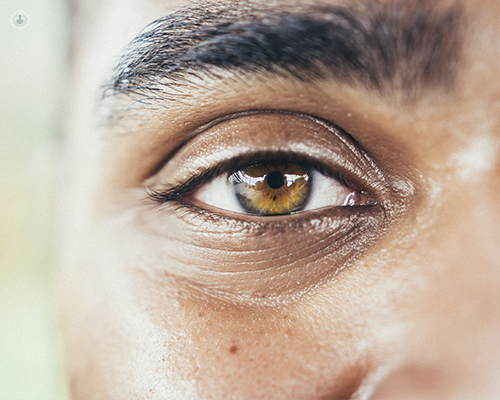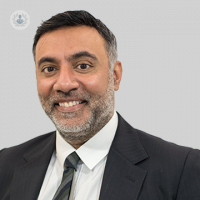Lens replacement surgery: what to expect
Written by:As we age, it’s natural that our lenses get harder, cloudier and unable to focus on objects that are a short distance away. When this natural lens gets cloudier, we call it a cataract. Mr Vik Sharma, a leading ophthalmologist from central London, guides you through the procedure, its efficacy, your expected recovery and the potential side effects.

What happens during lens replacement surgery?
Lens replacement surgery is carried out in 10 to 15 minutes. Patients are usually awake during the procedure and there is no pain involved.
A micro-incision is made on the side of your cornea which allows us to access your natural lens. Essentially, lens replacement surgery involves removing your natural, and often cloudy, lens from the eye through an ultrasound machine that sucks out the cataract and replaces it with an artificial lens implant which has the same anatomical structure. This artificial lens implant is injected through the micro-incision and is designed to stay there for the rest of your life.
Am I suitable for lens replacement surgery?
Lens replacement surgery is usually most beneficial for people above the age of 45, however people under the age of 45 can benefit too. Click here for my article about who is suitable for lens replacement surgery.
Are there different options?
The only potential difference between procedures is the choice of lens that will be inserted into the eye to replace the natural lens:
- Monofocal lenses – these offer really good distance vision but you'll need glasses for reading. This is the traditional lens that we've been using for over 40 years.
- Multifocal lenses - within this category, there are different designs. All of these design lenses aim to make people less dependent on spectacles. Therefore, they offer permanent nice and clear vision for seeing at a distance and for reading. About 90% of people with multifocal procedures never wear spectacles again.
Is it effective?
Lens replacement surgery is effective in the majority of cases. As previously mentioned, around 90% of patients never wear glasses again when the lens is replaced with a multifocal lens. Provided that the rest of the eye stays healthy, your eye should maintain its post-procedure vision quality. This is because your new artificial lens doesn’t rely on the muscles of your eye: it's a stable optic lens that will not degrade and will not require replacement in the majority of cases.
How is the recovery period?
The recovery should be quick and your vision will be blurry and possibly scratchy and watery for only a day or two. However, most patients don't have any pain or discomfort and can go about life as normal the day after the procedure. Over the first week or so, you should notice your vision getting clearer and better day by day. You will need to use some eye drops for about a month. These are important because they help the eye to heal in the right way.
Are there side effects?
Yes, the side-effects from lens replacement surgery are important, but very rare, and should always be discussed with your surgeon before you decide to have the procedure. There is a one in a thousand chance of having a serious problem. With regards to the lenses specifically, some of the lenses can give you halos or glare, particularly at night time.
Visit Mr Sharma’s profile to learn how he can assist you with your eye health and to book a consultation.


